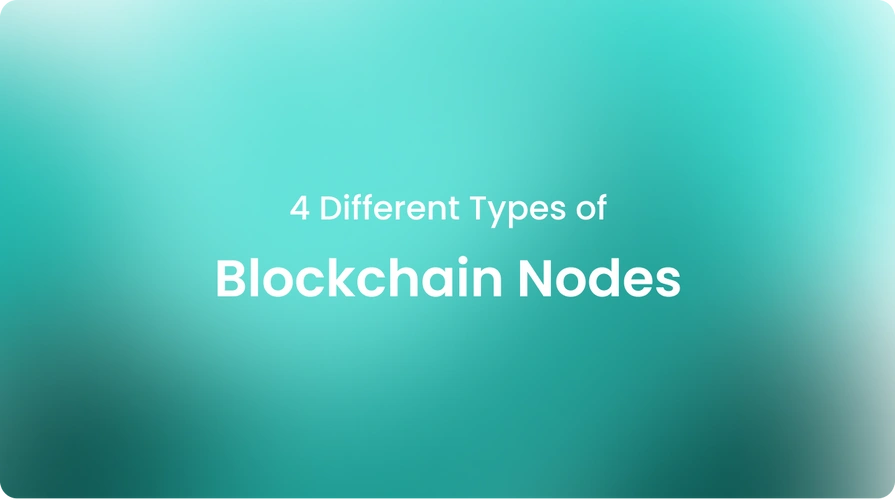|knowledgehub, technology
What Are the 4 Different Types of Blockchain Nodes?

Every blockchain network is made up of 4 different types of blockchain nodes. To realize the true potential of blockchain technology, you need to understand how it works through nodes. Each node plays a different part in making sure the system is secure, reliable, and able to work.
In this complete guide, we go deep into the world of blockchain nodes, explaining their different features, functions, and importance in the blockchain environment. Join us on this blog to find out the purpose of nodes in the blockchain, whether you're a beginner or an expert.
Nodes are essentially the areas that the devices on the blockchain occupy to perform and record transactions. Crypto transactions take place on nodes. In addition, copies of them are kept.
Nodes are defined with different definitions according to the area they are used in and the specific gravity they cover in this area. At a telecommunications or computer service point, nodes can be defined as redistribution points.
In addition, they can also be defined as the intersection points of the end point of communication and the starting point of the next communication.
In this context, nodes are actually included in the system to be used in different areas. To define this concept briefly, nodes can be a point or a corner component where a message is generated, received by the system, and transferred to another place.
In the blockchain, master nodes, staking nodes, miners, and authority nodes are the nodes that we encounter frequently and that are generally classified. Let’s explore each in detail!
Authority Nodes
This node type, which is closely related to the Proof of Authority protocol, is generally defined as proof of authority. It directly affects the transaction blocks in the blockchain.
In this context, the validation of these blocks is extremely important. Sometimes this system can be vital to a blockchain and avoid inconveniences such as outside leaks or sharing with third parties. Here, authority nodes are included in the system using reputation and identity.
Miner Nodes
In fact, those who know the mining system in the blockchain know this node type; at least they can guess. On the software side of mining, this miner node plays a significant role and is specifically responsible for providing an exact copy.
For example, when an ETH is mined, each mine created is used over this network and stored in this network.
Staking Nodes
Staking stands out more than other blockchain stages, and thanks to special rewards, this system significantly supports blockchain mining.
Staking nodes can also be portrayed as managers of this vital process. This type of node queues a token or coin to be integrated into the system on the blockchain and includes it when the time comes.
Master Nodes
The realization of transfers in open blockchain networks is an important function for the continuation of a blockchain system. However, this function requires a great deal of authority. This authorization is provided directly from a master node.
What is the purpose of blockchain nodes in crypto?
The nodes are the parameters that determine the sustainability and working state of the blockchain. Each of these blockchain nodes undertakes different tasks in itself.
Maintaining network security is often protected by sharing it with the people who keep the same registry, which is considered an important parameter for the reliability of this system.
In blockchain, each node combines with the next to establish a more secure network and create a more secure environment in every respect. This is actually the logic behind.
Had it been otherwise, the blockchain process could have become very easy prey for a blockchain hacker. Therefore, it is important that all keys are protected by dozens of different devices instead of being kept by a single person.
Each blockchain network does this in such a way that it actually passes it on to the next as a node. And each node is determined by the attitude of the next person or persons.
This presents a permutation and a highly probable attitude. When there is a systemic change, it is easily understood by other actors in the node.
In order for the nodes in these networks to remain unchanged, as many actors as possible must be involved. Transaction and data records on the blockchain have thus become clearly auditable and acceptable.
Having a decentralized and multi-node network also makes the network resistant to any centralized attack. This enables protection methods such as other nodes continuing to keep real records even if one or more of the thousands of nodes can be exploited and removing the hacked nodes from the network.
What are the benefits of using node services?
In blockchain technology, node services offer many benefits, such as participation, decentralization, and safety. They act as gatekeepers, checking deals and making sure the data is correct. This helps people trust each other on the network.
Node owners are in charge of their own data, which makes it more private and reliable. They additionally make networks more reliable, less reliable, and easier to view historical data. They are important for building decentralized applications.
Overall, node services are a key part of blockchain technology. They help users and the overall health of the entire system in many ways by eliminating vulnerabilities in the blockchain and helping to create a more secure and reliable network.
In this way, too many nodes are created, and crypto hackers are either prevented from making changes or there is almost zero probability that their changes will not be noticed.
The data is therefore secure because a crypto hacker cannot decrypt all the nodes on the network, which makes the security protocols more secure.
If you want to benefit from node services, Cryptobunq is here to help you. As a one-stop-shop crypto service provider, we offer a wide range of services such as batch payments, node as a service, tokenization, EURK euro stablecoin, exchange API, and more.
Contact us and start to benefit from the advantages of node services for your business. Explore the blockchain ecosystem with our guide for all your crypto needs!











